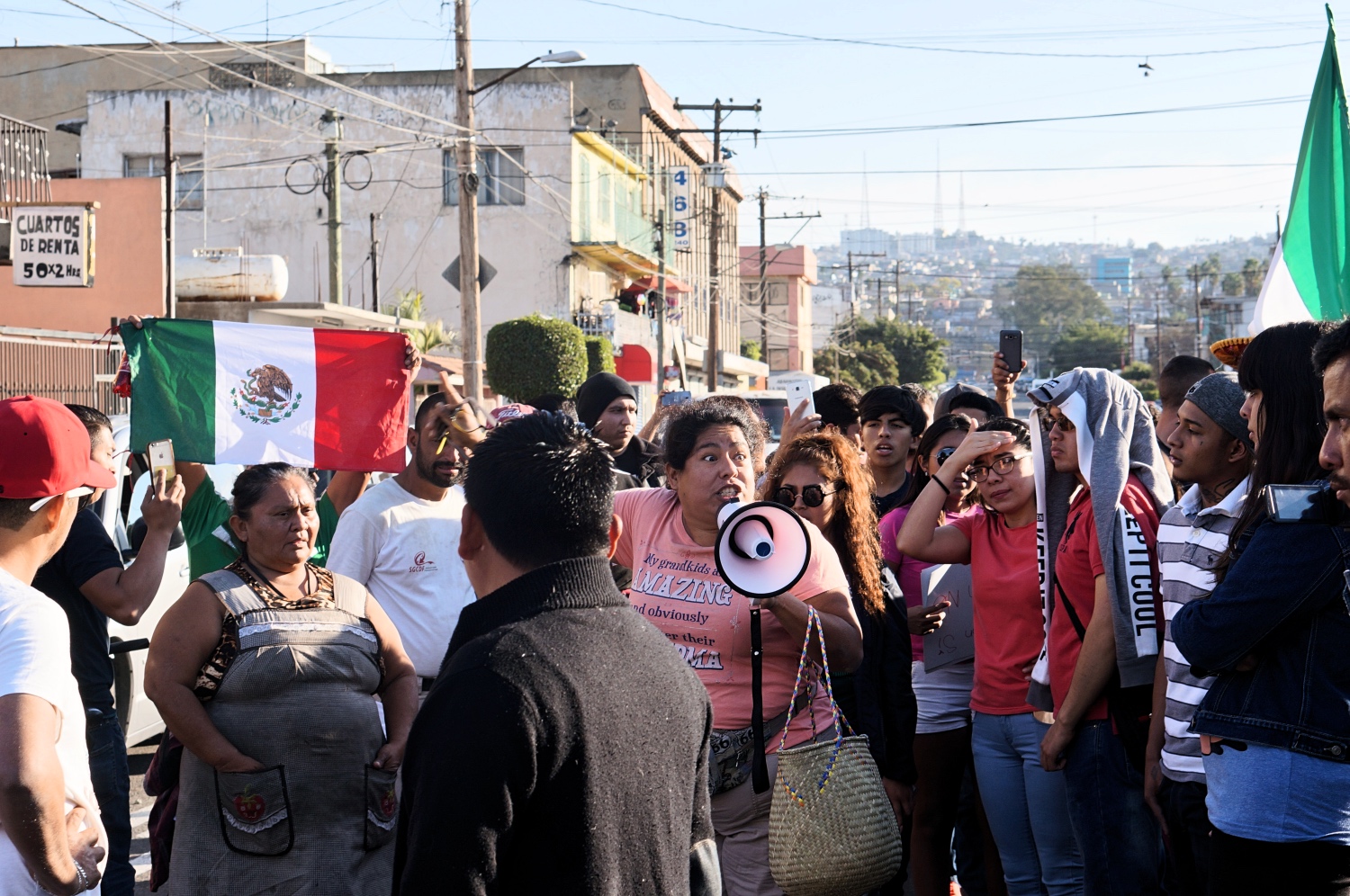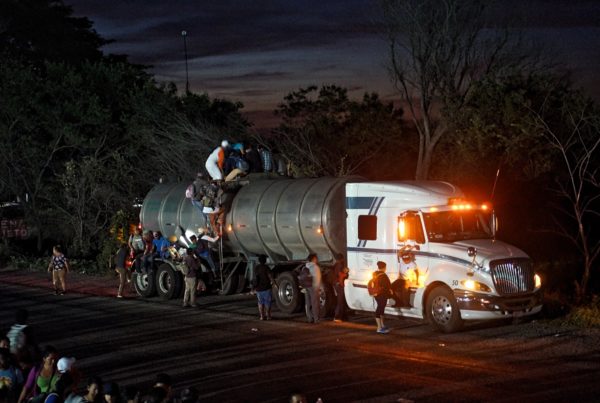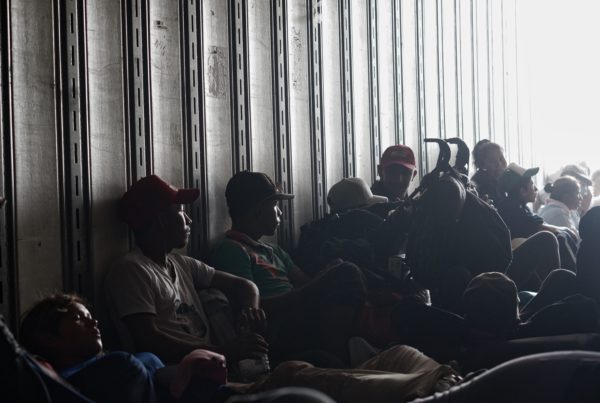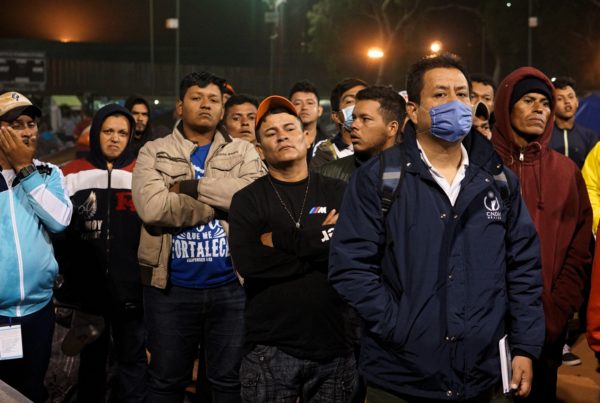A small crowd of between 50-100 people gather at the Glorieta Cuauhtemoc in Tijuana. They wave Mexican flags at the feet of the statue of the ancient Aztec ruler of Tenochtitlan. Why do right-wing protests always try to evoke a sense of nationalism with flags? As if identifying where they are born, where they come from, justifies excluding others. Their numbers are small but their voices are amplified by their anger.
I ask one man what the protest is about.
“We are not racists. We just want regulation for this migrant caravan. We the Tijuana people are good, we welcome foreigners. Here we have Asians, Europeans, Africans, all sorts of people. We all are a mix. We all are brothers.”
The crowd shouts, “Get out dogs.” As if to emphasise his point.
“We don’t have problems with anyone, just with the violence. We have enough problems in our city, in our state, in our country. The problem is the violence and the drugs that this caravan brings along.”
As far as I was aware, the members of the caravan had not instigated any violence or trafficked drugs from Honduras. The only news I had heard relating to violence was by locals towards members of the caravan, particularly the LGBTI community, in the area of Tijuana known as Las Playas.
The crowd scream and chant. It is an angry, aggressive rabble.
A woman sits on the angled slope of the glorieta in front of the statue of Cuauhtemoc, surrounded by shouting protesters. She holds a pink sign in front of her knees with a handwritten message that loosely translates as: “What balls you have. We also have problems.”
“They are not immigrants, they are invaders,” she says. “They don’t come here to work. They believe they are on holidays. They come to make noise. They don’t appreciate what they receive. They reject what is given to them. They are ungrateful. They are aggressive. They threaten us.”
She admits she has not had personal contact with the people of the caravan but has seen this type of behaviour on the news. Right-wing news outlets have reported that the people of the caravan are discarding donated Mexican beans, a symbolic rejection of Mexican hospitality.
“We don’t want them here in this country. They entered this country like buffalos, breaking down gates. We want to see if they do the same in the US border. They need to learn that this is not the way to do things.”
This is my first day in Tijuana and these arguments are new to me. Over time, I hear these same complaints repeated by taxi drivers and people in cafes. I continually hear talk of people in the caravan being violent, even though there have been very few reports of such.
Like many people from Tijuana, this protester uses the arrival of Tahitian migrants and refugees as an example of how to behave.
“They came to work. They crossed the border correctly. We don’t have any problems with them. With this caravan we do. We don’t want them here, or in any shelter, or in their consulate. We don’t want them here in any way.”
Haitian migrants started to arrive in Tijuana in 2016. Most came from Brazil where they had found work following Haiti’s devastating earthquake in 2010. When Brazil’s economy suffered a major downturn and jobs became scarce, many Haitians began leaving for the U.S. border. They travelled for months by land all the way to the US-Mexico border, in a manner not dissimilar to the caravan. The story goes that since they arrived in Tijuana, while they wait for entry into the US, they have found work and acted as model citizens.
The woman tells me she is from Tijuana and that this is the first time she has attended a protest like this because it’s the first time Tijuana has experienced such an “invasion”. Central Americans, including Mexicans, have been trying to cross the border at Tijuana for decades. What is it different about this caravan is that the people have arrived together, organised in their thousands, which allows people to perceive it as an invasion.
“These people complain they don’t have anything to eat, so why they reproduce and have children?” the woman says. “Why do they have children if they are not capable of looking after themselves? Why do they reproduce? Do not reproduce!!!”
The protesters roar, “Tijuana! Tijuana! Tijuana!”
The rabble marches to the shelter where the majority of the migrants are being housed in Tijuana. Riot police have blocked the road. The protesters push up against their shields and howl insults at the migrants, the police and the government.
A woman with wild eyes spits and growls into a loudspeaker.
“Peña Nieto. Son of a bitch,” she shouts, referring to the president of Mexico.
The crowd cheers. They want to know why the migrants are being escorted by federal police, not realising it’s to protect the migrants from people like them.
“Why are they getting so many facilities? Why are they entitled to these rights? Why are they being protected? We are the Mexican citizens.”
Mexico is a country that has suffered through violence, poverty and corruption. Perhaps it shouldn’t be surprising that some people feel aggrieved by the support of the migrant caravan when so many Mexicans are poor. However, I would think there would be more compassion for each other considering the stories from Honduras, Guatemala, Nicaragua and El Salvador in many ways mimic those of Mexico.
This type of language is almost identical to the language used against Mexican migrants who cross the border to the US. Among the crowd I see a woman holding a sign in support of Donald Trump, wearing a red trucker hat that says, “Make Tijuana Great Again”. I can’t understand how a Mexican can think Trump represents them.



